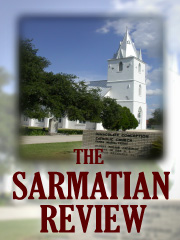| This Issue | Back Issues | Editorial Board | Contact Information |

From the Editor
January 2005
Volume XXV, No. 1
Two themes dominate this issue. The first is the celebration of the 150th anniversary of the arrival in Texas of Polish Silesians to whom many Texans of Polish background trace their ancestry. Our editorial opinion is that while the celebration was largely successful and it brought much joy to the participants, the long-range goals of this and other such celebrations have not yet been attained. Foremost among these goals is a place at the table in the American dialogue, the place which Americans of Polish background are yet to secure.
The second topic forced itself on the editors’ attention, as it were. In recent years we noted an increasing number of published texts dealing with the Polish role in the Second World War. This material was suppressed in Soviet-occupied Poland. The texts deal with the 1939-1941 deportations of Poles to the Gulag, and also with the deportations, unlawful imprisonments, and executions in Soviet-occupied Poland in 1945-1956. These events are described in the memoirs, reminiscences, and poetry written by survivors. Sarmatian Review has received quite a few submissions in this category. We are pleased to note an increasing number of scholarly books on these topics.
We publish a poignant review by Professor Raymond Gawronski of Lynne Olson and Stanley Cloud’s book, a review of Wesley Adamczyk’s book by Professor Marek Jan Chodakiewicz, and Sally Boss’s short review of Lilka Trzcinska-Croydon's Auschwitz memoir. Professor Halina Ablamowicz put together important translations of primary materials related to the deportations. Professor Kevin Christianson offers us a welcome respite from these topics in his subtle reading of Adam Czerniawski’s translation of Cyprian Norwid’s poetry.
Obviously the Gulag survivors have felt the urge to pour forth the suppressed memories and thus to contribute to future corrections. It will still take time for these primary materials to influence scholarly publications and then the official academic history of the Second World War as taught at American universities. It should be remembered that “jedna jaskółka nie czyni wiosny” [a single swallow does not yet bring in spring]. A large body of writing is necessary to make the corrections and to begin to change discourse. Within the body of discourse that now prevails in academia it is virtually impossible to introduce either the points of view or the facts of history that express in depth Polish concerns and Polish historical memory. To change the tenor and direction of intellectual discourse cannot be accomplished by a book or two, not even by a dozen books.
Professor Edward Rozek is well aware of these matters. In his review of Yearbook of the Polish Foreign Policy 2003 he argues that the Polish state is not yet a player in the international arena. Polish diplomacy cannot boast of a Talleyrand who defended the interests of the defeated France at the Congress of Vienna in 1815 and who scored spectacularly even though he played a weak hand. However, a hope for a Polish Talleyrand should not be abandoned. ∆
Back to the January 2005 Issue
The Sarmatian Review
sarmatia@rice.edu
Last updated 2/10/05